- Home
- Alison McGhee
Was It Beautiful?
Was It Beautiful? Read online
“To answer the title question, yes, it is beautiful and deeply moving, the life William T. constructed for his own happiness and the life he is provided with after that happiness collapses.”
— Boston Globe
“McGhee has written a lovely and successful third novel. She brilliantly captures the close but guarded ties between residents of a grieving small town, and delivers dialogue with the uncommon and impressive mix of precision, poignancy, and believability.”
— Minneapolis Star Tribune
“Alison McGhee’s is a novel of simple explanations, simple movement, and Faulkner’s favorite, most ferocious question: Can we ever really know one another?”
— Los Angeles Times
“McGhee is a beautiful writer, especially in her sense of place and her precision in describing characters.”
—Twin Cities Pioneer Press
“McGhee, author of critically acclaimed novel Shadow Baby, portrays in sparse and beautiful prose a setting and community that recall the cold, harsh landscapes of Richard Russo’s fiction.”
—Book Page
“McGhee’s portrait of a father’s impenetrable grief, and a small community’s attempt to break through it, is gracefully wrought.”
—Publishers Weekly
“Skillfully done…”
—Kirkus Reviews
“Fully realized characters and setting (a small town in the Adirondacks) make this novel a joy for readers who appreciate sensitivity without sentimentality in their fiction.”
—KUOW-AM “The Beat,” Seattle
ALSO BY
ALISON MCGHEE
Rainlight (1998)
Shadow Baby (2000)
This book is dedicated to Kate Di Camillo, Gabrielle McGhee, G. E. Patterson, Julie Schumacher, and Ellen Harris Swiggett
with love
Acknowledgement
MY THANKS TO JULIE SCHUMACHER AND BILL O’BRIEN, first readers of this book in draft form, to Julie Zelle for her knowledge and insight about the Book of Job, and to Paul Houghtelin for teaching me about perfect pitch.
Thanks to Gabrielle McGhee and Donald McGhee for their contributions of factual details, general moral support, and, in the case of Donald, many inimitable upstate New Yorker-isms.
Thanks to the MacDowell Colony for providing solitude, support, that daily picnic basket, and, most important, for Laurie Foos, Danny Felsenfeld, and Patricia Powell.
My thanks to Sibylle Kazeroid, Teryn Johnson, Jean Lynch, Lynne Amft, and Laura Duffy at Shaye Areheart Books for helping to bring this book into being. Deepest thanks to Shaye Areheart for her keen editorial eye, her unending encouragement, and her profound humanity, and to Doug Stewart of the Curtis Brown Agency for his patience, sense of humor, and wisdom.
To Gaby McGhee, G. E. Patterson, Julie Schumacher, Kate Di Camillo, Don McGhee, Sandy Benitez, Doug McGhee, Laurel Blackett, Holly McGhee, Meredith Wade, every single member of the Women of Eight, and Ellen Harris Swiggett, guardian angel and keeper of the third-floor garret: my love and devotion. Gan xie bu jin.
Oh that I were as in months past, as in the days when God preserved me; When his candle shined upon my head, and when by his light I walked through darkness; As I was in the days of my youth, when the secret of God was upon my tabernacle; When the Almighty was yet with me, when my children were about me.
—JOB 29:2-5
WILLIAM T. JONES PUSHED OPEN THE DOOR to Queen of the Frosties, the string of wind chimes that announced each new customer tolling in its jangly way. Grating.
Were there not already enough wind chimes in this world?
William T. pulled out his pocketknife and sliced through the string. The wastebasket next to the cigarette machine yawned. He shoots, he scores. That’s what his son, William J., would have said. But William J. wasn’t there to say it, so William T. thought it for him instead.
Wayne Brill glanced up from the cash register, where he was hovering over many small slips of paper. He smiled his dazed smile.
“It’s nice to see you here, Mr. Jones. Is Crystal’s closed then?”
Wayne was a former student of Eliza’s and couldn’t get past the Mr. and Mrs. even though he was nearly forty and had owned Queen of the Frosties for almost twenty years. He put a “then” at the end of most sentences. Long ago William T. had noticed this vocal peculiarity and now he could not unnotice it. Wayne Brill then.
“No.”
“Oh.”
Another person might have known how to proceed on the knowledge that Crystal’s was not closed, known how to ask a follow-up question, perhaps. But not Wayne. His perpetual look of befuddlement made him look like an old little boy. That’s how Eliza used to describe him when he was in her Great Books class at Remsen High. You mark my words, she used to say. Wayne Brill will look the same at forty as he does at eighteen: dazed. Only a year or so now before she’d be proven definitively right, and all signs were pointing to yes.
“How’s Genghis then, Mr. Jones?”
“Genghis is the king of cats, Wayne.”
“Still on table food then?”
“Still on table food.”
Sophie came backing out the swinging kitchen door carrying a carton of half-and-half and emptied it into the brown and yellow plastic cow creamer that sat in front of William T.
“William T.,” Sophie said, beginning to stack egg-smeary plates.
“Sophie J.”
“It’s not J., it’s S.,” she said.
She refused to look at him even though he willed her to. Look. Look. Look at me, Sophie. She took out her order pad. Poised her pencil. Look at me, Sophie. Please.
“To who do we owe the pleasure of your company this morning?” she said.
“To what do you owe the pleasure of my company.”
“You know what I meant, William T. Why are you here instead of down at Crystal’s?”
“I came to see you. There was once a time when you welcomed the sight of me. Isn’t that right, Sophie J.?”
Her pencil stayed poised.
“Jaywalk, jaybird, jail,” William T. chanted, as softly as the Gregorian monks on his wife, Eliza’s, favorite recording. Ex-wife. “J.J.J.”
“William T., do you want something to eat or did you come here just to harass me?”
“Two eggs over hard, bacon, English muffin, coffee. Thank you, Sophie J.”
“My name isn’t Jones anymore, William T.”
“It used to be, though, didn’t it? In case you’ve forgotten, you once were married to my son.”
She closed her eyes and the air in front of her slumped. He could see her body change, her bones shift forward and loosen, a familiar weariness crawl through her. She bent her head a bit and he noticed a single white strand threading its way through the honey of her hair. How was that possible? She was only twenty-seven.
“William T., what are you doing here?”
“I don’t know,” William T. said, surprising himself.
Sophie regarded him with her amber eyes, her tired amber eyes that looked older than twenty-seven. When William T. first knew her she had been a girl of seventeen.
“Where’s Burl?” she said. “Did you ditch him?”
A lump rose in William T.’s throat. He looked down at the scrubbed counter.
“Have you forsaken him? Left him to his own devices down at Crystal’s Diner?”
William T. looked at her, the weariness on her face.
“Burl’s a man of routine, you know,” Sophie said. “What will this do to his day, not having you there next to him at Crystal’s?”
She reached across the counter as if she were about to touch his hand, then thought better of it.
“He might be a stingy Welshman but he’s still your oldest friend,
William T.”
William T.’s stomach twisted. It could come at any time, the wave of sickness. Like just now, the words oldest friend slipping into his heart and making him miss Burl, Burl who was even now down at Crystal’s, reading the paper and waiting patiently.
Wayne knelt on the floor to arrange plastic jugs of milk.
“Is that Byrne Dairy milk I see, Wayne?” William T. said. “This is Dairylea country, don’t you know that?”
Wayne stopped smiling. Byrne Dairy milk. What was Wayne thinking? Had he no civic pride? Was it possible that Wayne did not even know what civic pride was?
It was possible. It was entirely possible.
“Byrne Dairy milk is mighty fine, it comes right from the sewer line,” William T. chanted. The lump in his throat eased off. He went to the restroom and when he emerged his breakfast was waiting, rooster and hen salt and pepper shakers set next to the cup of cooled coffee. An unknown someone had spread his English muffin with strawberry jam.
“I don’t like jam,” William T. said.
Sophie scrubbed at a spot on the counter with a mangy-looking sponge.
“It was William J. who liked jam,” William T. said. “Remember William J.? The guy you used to be married to? He was the jam man. Not me. Just in case you’ve forgotten.”
Sophie shook her head, gripping the sponge so that soap bubbles oozed down her fingers.
“Listen, William T.,” she said.
He raised his eyebrows.
“I haven’t forgotten. And you’re not the only one, you know. You’re, not, the, only, one.”
He kept his eyebrows up there. She stood back and looked at him. Kept on looking.
“Burl, for example,” Sophie said. “Burl lost him, too. And he feels as if he’s losing you now.”
William T. willed himself not to blink.
“And it’s killing him,” she said. “Just in case you haven’t noticed.”
Then she turned her back to him and headed into the kitchen. After a few minutes Wayne came out with a rag and started wiping down the counter. Wayne was an inveterate wiper.
“So, Mr. Jones, is it true that Genghis is a tomato eater then?” Wayne said.
“That is correct, Mr. Brill.”
Wayne was caught off guard by the Mr. Brill. It took him a moment before he was able to resume the conversational thread.
“Do you slice them up for him then, Mr. Jones?”
“He’ll take a tomato any way he can get it, Mr. Brill.”
Wayne ducked under the counter and emerged a moment later with the stem end of a cut tomato in his hand. Deposited it on the counter in front of William T.
“For Genghis then.”
“For Genghis,” William T. said, and he picked up the tomato and pushed his way out through the de-wind-chimed door to the parking lot.
In the chill air of his truck William T. willed himself to focus on the steering wheel. Ten and two. He himself preferred to keep his hands at four and eight, but that was beside the point. When he had taught William J. to drive, he had done it by the book. Keep your hands on ten and two, William J., he’d said.
The one thing William T. had not known how to teach his son was parallel parking. William T. was a man of Sterns, born and bred. He was not a man of the city, jockeying for position on tight streets and narrow alleys. Parking places were everywhere in William T.’s world and he just drove right into them, head on.
But William J. had to parallel park to pass the test, didn’t he?
Parallel parking was a job for Burl, William T. had decided, and Burl, without complaint, had stepped up to the plate. He had studied the instructions in William J.’s driver’s education booklet and then wheeled his mail wagon back and forth, back and forth, aiming for the wide space between Eliza’s car and William T.’s truck. Burl had muttered instructions to himself as he drove: Turn the steering wheel when your front wheels are even with her back wheels. Ease on in.
Burl’s face had been tight with concentration. His first few attempts, the wide front of his wagon had bulged out of the spot, wheels tilted at angles so obviously wrong that William T. had laughed. Now the front end sticking out, now the back. But Burl had done it. He had triumphed. In the end, both William J. and Burl would’ve done fine in New York City, should they ever have needed to park.
But they hadn’t ever needed to.
And why not?
Because William J. had not been a city boy. He, too, had been a man of Sterns. A man of Sterns like his father, happy to stay put in the Adirondacks, where space was not a problem. Where if you so desired you could pull off to the side of any road to watch a flock of wild turkeys cross at their leisure. You could take your time, admiring their tiny turkey heads, their fans of feathers.
Not a single car honking up behind you, wanting to parallel park.
“Jesus,” William T. said aloud to his knuckles, positioned correctly at ten and two. “Jesus H. Christ.”
He flexed his hands, slow and clumsy with cold, fisted them and blew into each tunnel of clenched fingers. This provoked a fit of coughing. He pictured Sophie inside Queen of the Frosties, her honey hair with its single white strand. She had been his daughter-in-law for nine years.
Was she still? Name change or no, with William J. gone now, was Sophie still his daughter-in-law? Sophie. Sophie. Sophie.
The truck windows were cranked shut and William T. cranked them open, leaning across the long bench seat to open the passenger-side window. Cold air swept in and gave him strength. He pulled the sleeves of his blue flannel shirt down as far as they would go over his hands.
In winter, William T. was a man of flannel shirts. Several if need be, but no coats. The hell with the so-called windchill factor.
He turned the key in the ignition and shoved down on the gas pedal. The engine roared obediently. The glove compartment opened without warning, as was its won’t, and out fell William T.’s New York State road map and the tire pressure gauge and Genghis’s old pink plastic hairbrush, full of tufted black fur. Pink? Jesus Christ. Eliza had bought a pack of three at a clearance sale.
William T. picked up the hairbrush and flung it out the window onto the frail ice of a mud puddle.
If William J. had been there he would have approved of the tossing of the pink hairbrush. He would have applauded his father’s decisiveness. Down with pink! William J. had kept a brush in his own truck for Genghis, a black one. He used to bring it out when he was visiting, give Genghis a good going-over. Genghis had loved it.
Would have, used to, kept. And William T. lost his train of thought, tears pricking behind his eyes again.
The engine revved soothingly.
The eggs were a sodden lump in his stomach and the coffee was repeating on him. The windows had started to steam over, and Queen of the Frosties, only a few feet away, was gradually obscuring. I’m my own goddamned cloud, William T. thought. He sat in the truck, his foot alternately stabbing and releasing the gas pedal. The engine roared and hushed, nervous as a cat. Fog rose silently on the windows and ghosted them with wisps of white.
William T. positioned his right hand at four o’clock. The hell with correct. The hell with parallel parking. He liked his left arm propped on the window, especially if it was summer and the window was open. But it wasn’t summer. It was early December, the green and gold of summer long gone. Directly north, up Route 12 in front of the truck, the Adirondack forests had already ignited and been snuffed out.
Four o’clock on an early December day was about the time his young boy self would wake to the silence before dawn, time to pull on the jeans and socks and boots and lumber jacket. Time to head north up the train tracks, stepping on tenuous ice too frail to survive even a hint of weight. Back then William T. was sixteen years old. Back then William T. stepped from tie to tie, just far enough to suit his stride, while the unmoving air burned his lungs with cold that felt like heat.
William T. lifted his left hand from where it lay frozen on the frozen door frame a
nd flapped it in the still cold air of the truck. Away with the image of himself as a boy. Down with memory! Shoo! But his hand was too big. Thick fingered, veins like ropes.
He rolled down the window, watching as the Queen of the Frosties parking lot, surrounded by evergreens, slipped inch by inch into view with a clarity that was almost too intense. He closed his eyes and inhaled. No. It was too late in the day. The air was not the way he remembered it being when he was sixteen and the sun had yet to appear on an early December
morning, when the simple act of breathing had burned his lungs with possibility.
Semis roared by on Route 12. The door to Queen of the Frosties slammed open and Sophie came down the steps one at a time, as if she were a child afraid of falling. She looked up and saw him watching. She stopped at the bottom of the steps, a few feet away, and watched him back.
“You walk down those steps like a little girl,” William T. said.
She stood there, hands jammed into the pockets of a blue parka too big for her, a sloppy-looking thing with a jumbled-up hood.
“That parka’s too big for you.”
She said nothing, just kept watching him. She was wearing the same sneakers she always wore, sneakers that at one point in time must have been white. William T. wondered if she had just the one pair or if her closet was filled with rows of them, lined up the way years ago he had once, through the smudged window in the swinging kitchen door at Queen of the Frosties, observed her intently lining up pairs of rooster and hen salt and pepper shakers on a tray.
She kept watching him, as if he were something else, something other than William T. Then she took her hands out of the parka.
“It was his,” she said.
“What was whose?”
“The parka. It was his. You don’t recognize it?”
Holy Christ! Wasn’t it the same parka—
“Sophie! Wasn’t he wearing that when—”

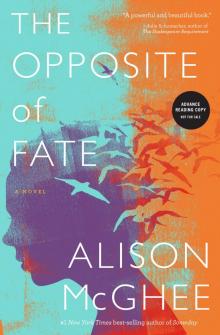 The Opposite of Fate (ARC)
The Opposite of Fate (ARC)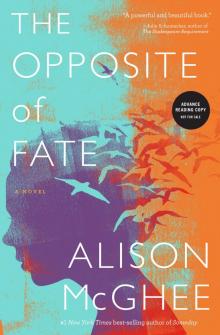 The Opposite of Fate
The Opposite of Fate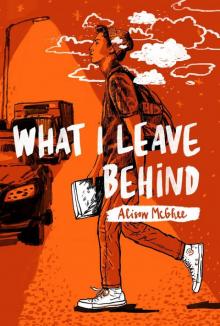 What I Leave Behind
What I Leave Behind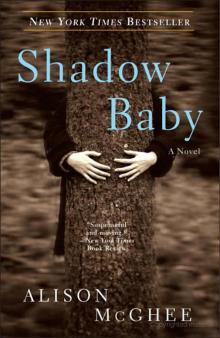 Shadow Baby
Shadow Baby All Rivers Flow to the Sea
All Rivers Flow to the Sea Was It Beautiful?
Was It Beautiful?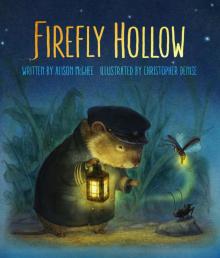 Firefly Hollow
Firefly Hollow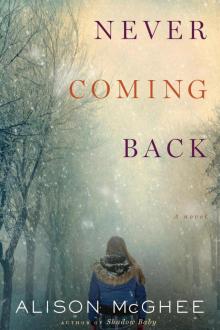 Never Coming Back
Never Coming Back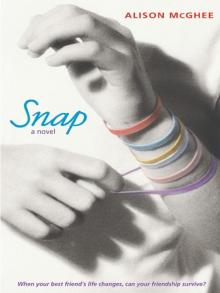 Snap
Snap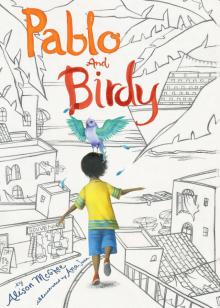 Pablo and Birdy
Pablo and Birdy